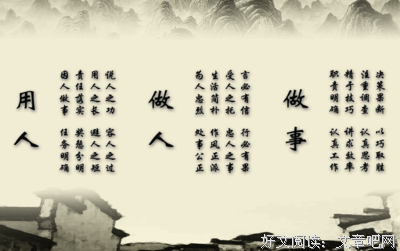Eleven Minutes的读后感大全
《Eleven Minutes》是一本由Paulo Coelho著作,Harper Perennial出版的Paperback图书,本书定价:USD 13.95,页数:320,特精心从网络上整理的一些读者的读后感,希望对大家能有帮助。
《Eleven Minutes》精选点评:
●有一点过了,我还是喜欢那种故事情节重,道理自己去琢磨的书。
●love urself first
●因为没有拥有你,所以我不会失去你;当我没有什么可以失去,我也就不害怕什么了。
●11分钟 果然是作者的夸张 没有科学根据 哈哈哈
●其实回想起是一个很俗的故事,但是胜在一大段一大段的女主人公的独白。
●出差路上读的,有意思的一本书。前半部分很能relate,后半部分觉得有点玄乎,但仍多一颗星给爱和完美结局。
●下上.反正是本好书,有思想,有故事,呵呵,还觉得有点文艺,有点像<生命中不能承受之轻>的风格
●Paul Coelho的故事总是有很多隐喻,高于生活想要指导人生,所以其中有很多抽象的词,Desire, love之类的,但是我还是喜欢直接描写生活的那些。我想其中对命运,人生,欲望,性的思考意义远大于那个大团圆结局,但是我读完并没有恍然大悟之感。
●11分钟,太短了吧......
●Excellent book
《Eleven Minutes》读后感(一):I have to think about love and write
第一次看英文小说看得这么认真,一直到晚上十二点才合书睡去.我觉得这是一本适合女孩子看的书,从阅读中获得了很多乐趣,以及感动.
文章讲了很多:从一个小女孩的暗恋,到大女孩的失恋,再到失望,但是不放弃对爱的追求,一直到明白了爱的自由,性与爱的结合,似乎是一部女孩子成长为女人的书,在成长的过程中,探索着爱,性,以及灵魂,和自由.
觉得作者是一个很懂得女性心理的人. 一般情况,男性都觉得爱很飘渺,如果嘴里总是爱来爱去,会让他们觉得掉面子-----这是一个朋友这么说的,在我问他为什么不说一说爱的时候.
可是当从罗素,从连岳,从保罗这里听到爱这个字眼,我一点都没有觉得他们丢面子,我觉得他们活在生活里,并且爱上了他们.
如果连爱都不谈了,还有什么重要的呢?
我做了很多摘抄:
她说:I visited his soul
她写: what the eyes don't see, the heart does grieve.
还有她日记里的那个关于鸟和女人恋爱的故事,非常美.我打算翻译出来.
看到有人说主人公去做皮肉生意,觉得很刺,不舒服.
《Eleven Minutes》读后感(二):一个关于妓女的fairy tale
一个关于妓女的fairy tale,除了对性工作者生活的猎奇,还读到了SM,总的来说感觉太fairy tale。最令我惊讶的是作者对于妓女的无限宽容,貌似这是种和正常工作完全无差别的工作,用自己的时间和肉体来换取报酬(金钱),我唯一的解释就是文化不同吧,国外对于卖淫还是有组织有纪律的,不像国内属于地下产业,感觉总是不上台面,另外一个解释,那就是作者本人的偏好了,这个没什么好说的。
另外两个零碎的看法是:一,Maria真是个高素质有文化的prostitute,不光一边工作一边读书学习,去图书馆借阅有关sex(为了更职业)和farm management(为了挣钱之后买个farm用)的书,每次写的日记那是一个高水准,感觉不是一般中学文化人的手笔,莫非她是大学毕业后去日内瓦卖淫的? 还真不知道,也许得再查查。所以感觉这个人物太不真实。
二,如果说Sex是小说的主题的话,时间貌似是副主题,从标题eleven minutes到里面出现的关于各种时间的反思,莫非有点哲学倾向的作者都喜欢在这个问题上打转?或是这根本就是个绕不开的母题?
印象深刻的是几个片段(剧透了):Maria第一次恋爱失败的片段(小男生借铅笔她因为害羞拒绝了,以后小男孩再没主动,也就失去了第一次恋爱);Maria和Terence的SM(不知道为什么Terence比男主什么Ralf让我感觉更有意思更真实,Maria和Ralf的“爱情”在我看来多少过于虚浮了,虽然作者一个劲地在那写soul啊soul。Terence后来就领盒饭了,让人很遗憾。)话说回来Maria和Ralf刚开始互赠礼物那段(Maria送Ralf一支笔,Ralf送Maria他小时候渴望而不得亵玩的玩具火车头)还是有点意思,别的没看出多少新意。最后一个就是,一向老实中规中矩的图书管理员的一次出轨,“…she had ceased to be a faithful wife, housewife, loving mother, exemplary public servant and constant friend, and reverted to being simply a woman”(Coelho, 251)
最后,我真心不喜欢这结局,fairy tale到底,其实我觉得他们不在一起更美好些。
语言简单,阅读无难度。
《Eleven Minutes》读后感(三):不动声色的诚实
这是看的第一本Paulo Coelho的书。应该不算他的代表作。而最初被推荐看时,粗粗扫了一下简介,也并没有放在心上。故事看上去很简单,而且显得有点俗气。讨论的是sex 和 love。说的是一巴西女孩怎么到了瑞士怎么做了皮肉生意又最后怎么找到true love的故事。这是一个大家一眼就能猜得到大致主线和发展的小说。然它的精彩之处其实并不在于情节的设置或者人物间复杂关系的微妙刻画,而只是在于发展过程中的改变,和平直又坦诚的叙述。
所有的事都发展的水到渠成。不加修饰的自然到就好像是平时生活中习以为常的。或许是由于故事基于真人真事的缘故。我们的视线,随着maria的成长而变化,跟着她看跟着她想,就像每个普通的女孩都会有的梦想,期待,怀疑,和反思,或者更多的时候,把自己分裂开来,脑子和身体在一边,心在另外一边。
Oddly enough, I have no sense of guilt. I used to think of girls who went to bed with men for money as people who had no other choice, and now I see that it isn't like that. I could have said 'yes' or 'no'; no one was forcing me to accept anything.
于是,那女孩开始了边缘职业的边缘生活。而书名之所以为十一分钟,所指代的也在这时显现:每次ML的平均时间,也就是11分钟了。
maria的工作,服务的客户都是社会精英。倒反而是这样的场合,她却更清楚的看到,人是胆怯又孤独的。男人女人都是。有人大声说话来掩饰,有人借酒壮胆。但无论如何排解,孤独感总是愈加深刻。而去红灯区,从某个层面上理解,和磕药一样,是想排遣现实的不安。只是body和soul,不能分离太久。
后来她遇到了画家,目光如炬直视到她的soul。于是两人电光火石的passion。而同时又碰见了另一个‘特殊顾客’,执迷于从痛苦里寻求无比的欢愉。像黑洞那样被吞噬后的没有边际的平静和空间。然后是光和暗的交错摇摆。直到画家告诉她痛苦的真相:
Does a soldier go to war in order to kill the enemy? No, he goes in order to die for his country. Does a wife want to show her husband how happy she is? No, she wants him to see how devoted she is, how she suffers in order to make him happy. Does the husband go to work thinking he will find personal fulfilment there? No, he is giving his sweat and tears for the good of the family. And so it goes on: sons give up their dreams to please their parents, parents give up their lives in order to please their children; pain and suffering are used to justify the one thing that should bring only joy: love.
如此淋漓又直见性命。而文字却是一如既往的平直又不带表情。很简单。却一步到位。没有掏心掏肺大喜大悲。有的只是平静的描述。平静的讲一个普通的故事。平静的叙述11分钟的每个细节,每个反应,每丝体验。公开又坦诚的表达着过程里遇到的问题,隐藏的历史,最终的神圣。
或许就是因为文字的平易近人,书很容易读。线条很清晰。态度很坦诚。其实女主一直铁了心的要离开。那段时间的心理叙述铺垫的很到位。关于因自由而爱,或者因爱而自由。最终的结局虽然没能免俗的是个happy ending,不过鉴于没有三星半。所以,还是给了四星。
最后说句题外话,作者是个男人,能把女性心理写的如此真实,想必是经历不凡吧。
《Eleven Minutes》读后感(四):回忆起一个朋友的不错的书评,可是一直没找来原著看
-- By Celine Hsu
I've been thinking about the book “Eleven Minutes” a lot lately. It took me five days to finish it and in between these five days I had time to ruminate.
Day One - not too bad
Day Two - I liked it
Day Three - not so sure
Day Four – getting irritated
Day Five - finally finished it and I didn’t believe in it
Just like a simple curve, my appreciation for this book went up steadily and then went down steadily. But why? You once told me you liked it and you thought I would too. So what made me liking it at first, then hating it in the end?
And here is the truth. The truth is, I don't like the fairy tale.
In fact, I don't believe in fairy tales. I tend to believe that life is dark and intimidating. Pessimistic me just doesn’t believe that life can be so simple without any complication.
And I don’t believe that love is the only salvation.
It just doesn’t make sense to me. It’s just all too easy.
It shouldn’t be that easy, I think. It should be harder for her. It should be harder for him. They should have come across all the inconceivable difficulties, they should have battled all the indescribable humiliation, they should have…they should have… suffered. Because love should not come easily.
Can you believe it? After almost three years I wrote “The language of love” for you, I still believe that, without obstacles, love does not exist.
ut it does, does it?
Like you and me.
I started to see the underlying reason that made me feeling uncomfortable liking it. Because somehow I saw my story in hers, and hers in mine.
he lost her belief in love. Love to her, is a painful thing that only wounds her with unbearable heartbreaking aches.
The only way to avoid it is to block it. Yes. To block it. Entirely.
To run when you see it coming near you.
You push it. You snub it. If necessary you humiliate it with contempt.
You don’t need love because it only gives you pain. And you can’t control pain.
You can, however, control yourself by not falling in love again.
And therefore when you first came into my life all I wanted to do was to block you. I wanted to be in love with you but my subconscious told me that it would come to an end dreadfully soon.
o I built this massive wall. The more I fell for you, the more bricks I laid. This wall grew higher. And I concealed myself behind it.
Do you see the similarity here? In this book, she ran away. Although she knew the man she fell in love with would cherish her, nurture her, cultivate their love and encourage it to grow further and further. She still ran away. And he came to get her.
I ran away too. And you, you never let me go.
